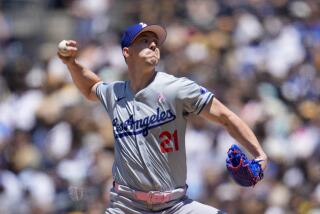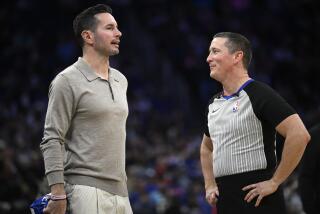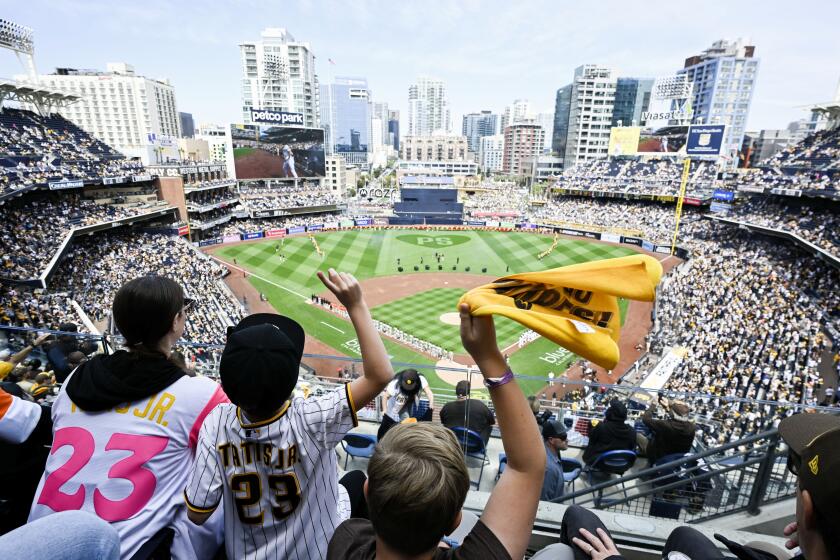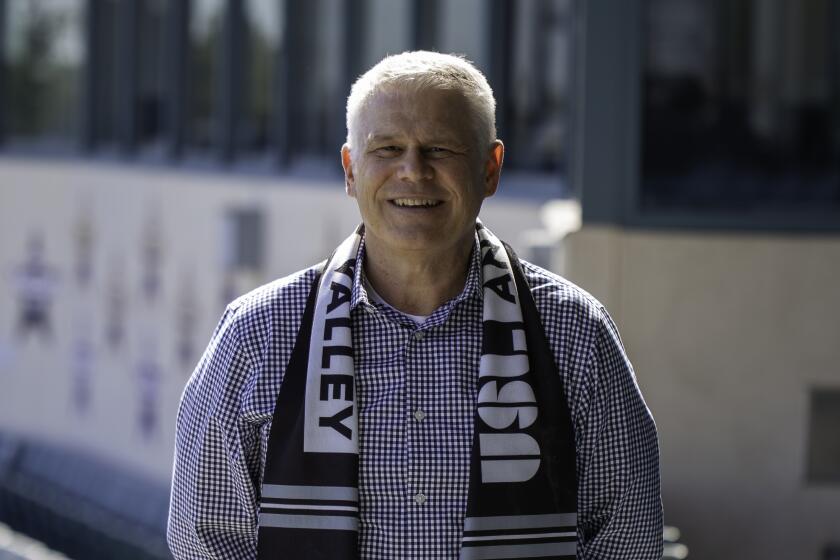Nevin’s Road to Success Takes a Detour : Former Can’t-Miss Kid From Fullerton Has Gotten Lessons in Humility in Minor Leagues
His days as one of baseball’s golden boys have passed, even if one of his trading cards on the market this year labels him one of the “phenoms” of the game.
In 1992, Phil Nevin carried a “can’t-miss” tag as the No. 1 choice in the amateur draft.
He was the most valuable player in the College World Series when his Cal State Fullerton team finished second to Pepperdine. He went on to the Olympics in Barcelona and won the Golden Spikes award as the year’s top amateur player.
The Houston Astros gave him a $700,000 signing bonus and put him on the threshold of the major leagues with triple-A Tucson in 1993.
It was fast-track treatment. Big expectations. Heady stuff.
But all that changed.
The turning point probably came sometime in the disastrous stretch Nevin endured last season after he was called up to the major leagues for the first time.
Nevin managed only seven hits in 60 at-bats (.117) and made three errors for the Astros. There also was the well-publicized shouting match in Manager Terry Collins’ office when Nevin was told he was being sent back to the minors.
Before the season ended, the Astros pulled the rest of the rug out from under Nevin’s world by trading him to Detroit.
And this year, for the first time, Nevin found out what life is like in double A, playing for Jacksonville, Fla., in the Southern League.
Call it a dose of reality.
“I learned about long bus rides,” Nevin said. “It was my first time for that.”
Nevin also learned about being a survivor.
Part of that was a crash course in learning how to be a catcher. Just before the beginning of the season, the Tigers asked him to try the position, and Nevin agreed. He caught 62 of the 98 games he played for Jacksonville. He hopes the experience will help revive his career.
Nevin, 25, is back with Detroit for the final stages of the regular season, with another opportunity to show he belongs in the majors.
“It’s good to be back,” Nevin said, “but it’s time for me to produce up here now.”
Nevin says he feels good about the experience in double A, despite those long bus rides.
“I hope I’ll be able to look back on those four months I spent with Jacksonville as the four most important months of my career,” Nevin said. “I made some good friends there, and I think they looked at me as a leader. I also think I became a better baseball player there. Learning how to catch is one part of that.”
Nevin had played most of his career at third base, but the Astros were starting to have concerns about Nevin’s limitations there when they traded him for relief pitcher Mike Henneman.
The Tigers moved Nevin to the outfield, and he played 29 games there before the 1995 season ended, hitting .219. Then Detroit General Manager Randy Smith asked Nevin if he was willing to try catching.
Nevin, who caught as a sophomore at El Dorado High, took it as a challenge.
“He really worked hard at learning the position,” Jacksonville Manager Larry Parrish said. “And for a guy just thrown into the fire, I thought he did really well. He has a quick release on his throws, and his arm strength is fine for the position.
“The thing he still needs to work on is being able to anticipate when a pitch is going into the dirt, and he’s not as ready for that as he needs to be.”
Nevin also played 11 games in the outfield, 12 at third base and one at first.
Nevin believes he improved as a hitter at Jacksonville, and a return to his old batting stance might have been an important factor. He was hitting .294 with 24 home runs and 69 runs batted in when Detroit called him up earlier this month.
Parrish and Nevin watched several tapes of Nevin, who bats right-handed, hitting at Fullerton.
“Before, Phil had held his hands high, like a Juan Gonzalez, but when he went to Houston they made a change and dropped his hands down,” Parrish said.
“What happened is that for some reason it gave him a little hitch in his swing. We didn’t make the change back to the old stance until around the first of July, and he ended up hitting 14 home runs that month.
“In the old stance, he seemed to be able to get the ball into the air easier to center and right field.”
Nevin says the big difference is that he feels more comfortable at the plate.
He also thinks catching regularly might have helped his hitting.
“As a catcher, you can’t take your bad at-bats with you out on the field, and I know I do that sometimes when I’m playing the other positions,” he said. “When you’re catching you don’t have time to think about it. And maybe I’m taking some better at-bats for that reason.”
Nevin returned to the majors with three hits in his first game back, and Manager Buddy Bell has been platooning him in the outfield against left-handed pitching while using him occasionally behind the plate and at third. Nevin is batting .304.
Steve Lubratich, the Tigers’ assistant general manager, says Nevin will have ample opportunity to show what he can do in the remainder of the season.
“For him, it’s a matter of playing good defense wherever he’s playing, and putting up good numbers offensively,” Lubratich said. “If he does that, he’ll be fine. He did establish this summer that he can catch, but just how good he can be there still hasn’t been determined.”
Nevin hopes to continue his education as a catcher in the fall instructional league in Arizona.
“We haven’t talked about the winter yet,” Nevin said. “But I’d like to keep working on it.”
The Tigers are much better stocked at catcher than they were last spring. They traded for Brad Ausmus, and he appears set to be the starter next season. The Tigers also have Mark Parent, although there have been indications he might not sign a new contract with the Tigers. Detroit also has another top catching prospect, Raul Casanova, who is in triple A.
“When we decided to make the move with Phil, we didn’t have either Ausmus or Casanova,” Lubratich said. “We have more depth there now than we thought we’d have, but it’s not that we’ll be shopping Phil or anyone this winter. We’ll see how it goes.”
But Nevin’s utility value has increased, which could help him stick with Detroit.
If that happens, it would relieve the pressure of feeling he must produce immediately.
Parrish had one suggestion for Nevin: Forget about all the expectations that come from being a No. 1 draft choice.
“Phil gets frustrated sometimes when he’s not producing like a Ken Griffey Jr.,” Parrish said. “But there aren’t many like him out there. Phil just needs to understand that he can still be a good player without doing that.”
More to Read
Get our high school sports newsletter
Prep Rally is devoted to the SoCal high school sports experience, bringing you scores, stories and a behind-the-scenes look at what makes prep sports so popular.
You may occasionally receive promotional content from the Los Angeles Times.






